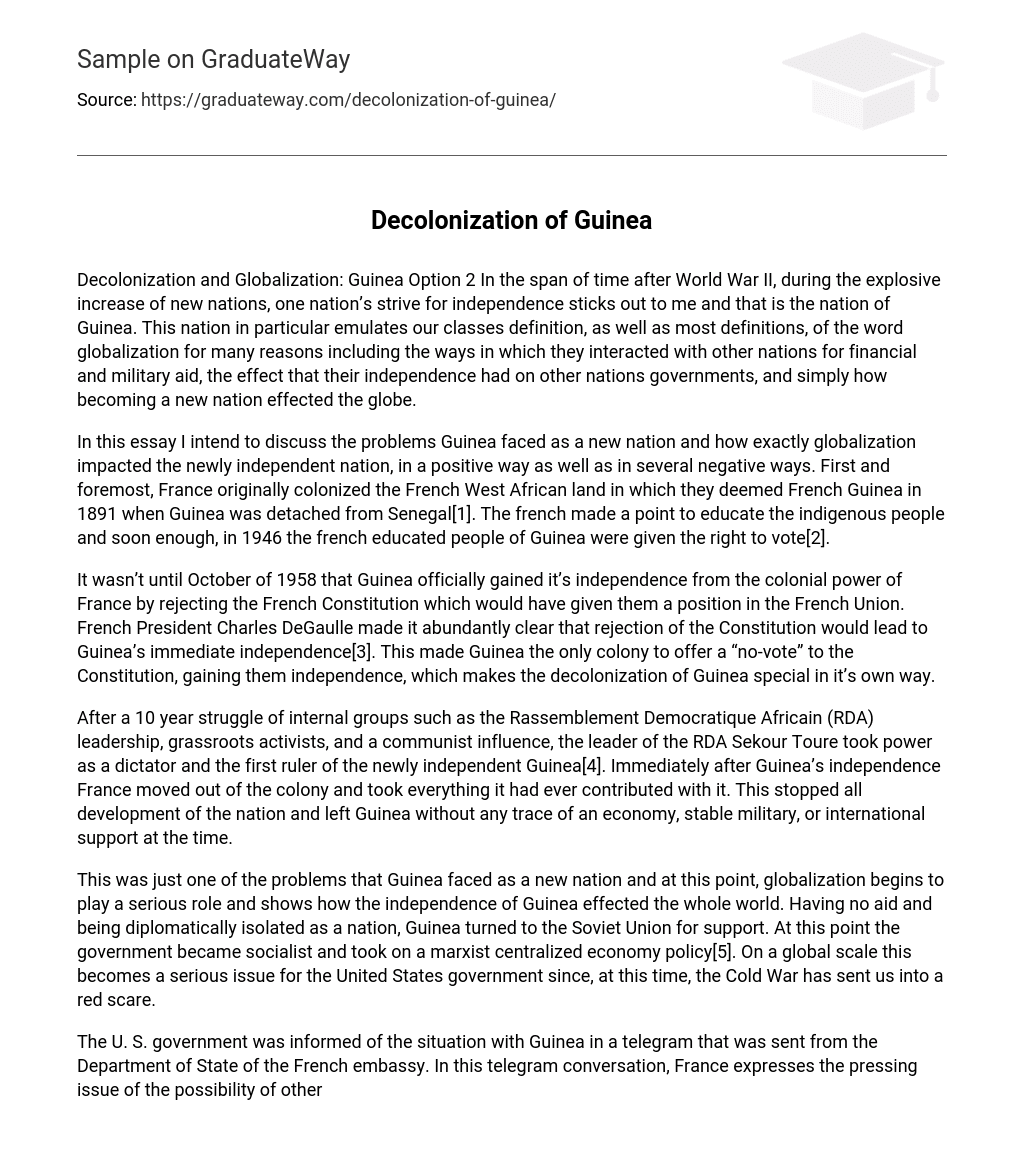In the span of time after World War II, during the explosive increase of new nations, one nation’s strive for independence sticks out to me and that is the nation of Guinea. This nation in particular emulates our classes definition, as well as most definitions, of the word globalization for many reasons including the ways in which they interacted with other nations for financial and military aid, the effect that their independence had on other nations governments, and simply how becoming a new nation effected the globe.
In this essay I intend to discuss the problems Guinea faced as a new nation and how exactly globalization impacted the newly independent nation, in a positive way as well as in several negative ways. First and foremost, France originally colonized the French West African land in which they deemed French Guinea in 1891 when Guinea was detached from Senegal. The french made a point to educate the indigenous people and soon enough, in 1946 the french educated people of Guinea were given the right to vote.
It wasn’t until October of 1958 that Guinea officially gained it’s independence from the colonial power of France by rejecting the French Constitution which would have given them a position in the French Union. French President Charles DeGaulle made it abundantly clear that rejection of the Constitution would lead to Guinea’s immediate independence. This made Guinea the only colony to offer a “no-vote” to the Constitution, gaining them independence, which makes the decolonization of Guinea special in it’s own way.
After a 10 year struggle of internal groups such as the Rassemblement Democratique Africain (RDA) leadership, grassroots activists, and a communist influence, the leader of the RDA Sekour Toure took power as a dictator and the first ruler of the newly independent Guinea[4]. Immediately after Guinea’s independence France moved out of the colony and took everything it had ever contributed with it. This stopped all development of the nation and left Guinea without any trace of an economy, stable military, or international support at the time.
This was just one of the problems that Guinea faced as a new nation and at this point, globalization begins to play a serious role and shows how the independence of Guinea effected the whole world. Having no aid and being diplomatically isolated as a nation, Guinea turned to the Soviet Union for support. At this point the government became socialist and took on a marxist centralized economy policy. On a global scale this becomes a serious issue for the United States government since, at this time, the Cold War has sent us into a red scare.
The U. S. government was informed of the situation with Guinea in a telegram that was sent from the Department of State of the French embassy. In this telegram conversation, France expresses the pressing issue of the possibility of other African colonies following Guinea’s example and achieving independence however, with Guinea’s unstable political structure and possible motives not in the best interests of the United States government and it’s allies, they suggest we use caution in recognizing Guinea’s independence.
It is later mentioned in the telegram that France had sent similar messages to all of the allies and it had been decided to recognize Guinea as a nation but to remain not involved with their development at the time. Under the leadership of Toure, the nation of Guinea chose a stance of “positive-neutralism” during the cold war and later took on “an image of radical experimentation in social and political development in Africa.
Guinea slowly but surely began to develop economically as a new independent nation despite it’s difficulties in recognition from other world powers and France’s sudden withdrawal of all of it’s resources. Through France’s communication of the issue of Guinea, the Soviet Union’s support of Guinea, and the growing popularity of decolonizing African colonies, globalization helped start the new nation’s struggle, as well as helped neutralize the worlds concern of a further spread of communism. Guinea’s decolonization from France emulates what our class knows as globalization.





